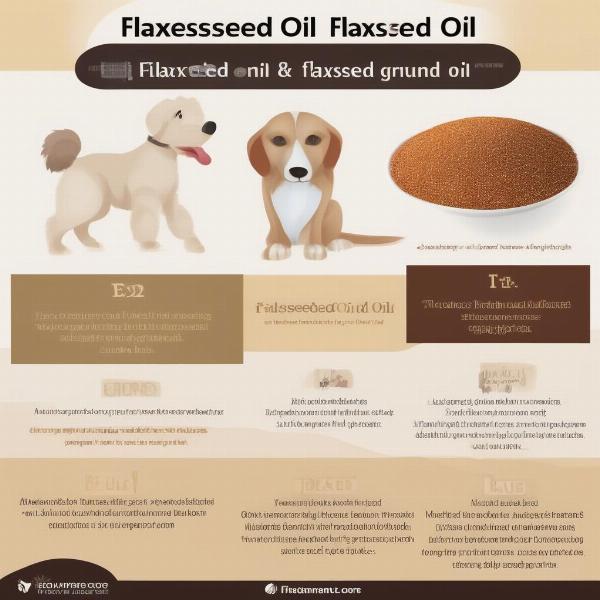Flaxseed for dogs has gained popularity as a nutritional supplement. This tiny seed packs a powerful punch, offering a range of potential health benefits for our canine companions. But what exactly makes flaxseed so beneficial, and how can you safely incorporate it into your dog’s diet? This article will explore the advantages, considerations, and best practices for using flaxseed to enhance your dog’s overall well-being.
Understanding the Benefits of Flaxseed for Dogs
Flaxseed, also known as linseed, is a rich source of omega-3 fatty acids, fiber, and antioxidants. These nutrients can contribute to a healthier coat and skin, reduced inflammation, improved joint health, and better digestion. Omega-3s, particularly alpha-linolenic acid (ALA), are essential fatty acids that dogs cannot produce on their own and must obtain through their diet. They play a crucial role in maintaining cell membrane health and reducing inflammation throughout the body.
The fiber in flaxseed can aid in regulating bowel movements and promoting a healthy digestive system. Both soluble and insoluble fiber are present in flaxseed, helping to bulk up stool and prevent constipation and diarrhea. Additionally, flaxseed contains lignans, which are antioxidants that may have anti-cancer properties.
How to Incorporate Flaxseed into Your Dog’s Diet
While whole flaxseeds are not easily digestible by dogs, ground flaxseed or flaxseed oil can be added to their food. Start with a small amount and gradually increase the dosage as needed. It’s important to note that flaxseed contains a small amount of cyanide, which can be harmful in large quantities. Therefore, it’s crucial to follow recommended dosages and consult with your veterinarian before adding flaxseed to your dog’s diet, especially if your dog has any underlying health conditions.
How much flaxseed should I give my dog? A general guideline is 1/4 to 1/2 teaspoon of ground flaxseed per 10 pounds of body weight daily. However, always consult your vet for personalized recommendations.
Potential Side Effects of Flaxseed for Dogs
While flaxseed is generally safe for dogs, some potential side effects can occur, especially if given in excessive amounts. These may include loose stools or diarrhea, gas, and allergic reactions. If you notice any adverse reactions, discontinue use and contact your veterinarian.
Flaxseed Oil vs. Ground Flaxseed: Which is Better?
Both flaxseed oil and ground flaxseed offer benefits, but they differ in their nutrient profiles. Flaxseed oil is a concentrated source of omega-3 fatty acids, while ground flaxseed provides more fiber and lignans. Choosing between the two depends on your dog’s specific needs. flaxseed oil for dogs can be a good choice for dogs with skin and coat issues, while ground flaxseed might be better for dogs with digestive problems.
 Flaxseed oil vs. ground flaxseed
Flaxseed oil vs. ground flaxseed
Can Flaxseed Help My Dog’s Arthritis?
The omega-3 fatty acids in flaxseed have anti-inflammatory properties that may help alleviate the symptoms of arthritis in dogs. However, flaxseed should not replace prescribed medications for arthritis, and it’s essential to discuss its use with your veterinarian as part of a comprehensive treatment plan. anti inflammatory diet for dogs can provide more details on this.
Conclusion
Flaxseed can be a valuable addition to a dog’s diet, offering potential benefits for skin and coat health, joint function, and digestion. However, it’s essential to use it responsibly, following recommended dosages and consulting with your veterinarian. By incorporating flaxseed appropriately, you can help support your dog’s overall health and well-being.
FAQ
- Is flaxseed safe for puppies? Consult your veterinarian before giving flaxseed to puppies.
- Can flaxseed help with dog allergies? Omega-3s in flaxseed may help reduce inflammation associated with allergies.
- How should I store flaxseed? Store ground flaxseed and flaxseed oil in an airtight container in the refrigerator to prevent oxidation.
- Can I give my dog whole flaxseeds? Whole flaxseeds are not easily digestible. Use ground flaxseed or flaxseed oil instead.
- What are the signs of a flaxseed allergy in dogs? Signs of allergy can include itching, redness, vomiting, and diarrhea.
- Can flaxseed interact with other medications? Consult your veterinarian about potential interactions with any other medications your dog is taking.
- Can I add flaxseed to homemade dog food? Yes, you can incorporate flaxseed into homemade dog food, ensuring proper dosage. ultra oil for dogs may also be beneficial in this context.
About ILM Dog: ILM Dog is your trusted global resource for expert advice on dog care and nutrition. From breed selection to health and wellness, training tips to product recommendations, we provide comprehensive and practical information for dog owners of all experience levels. Contact us at [email protected] or +44 20-3965-8624 to learn more about how we can help you provide the best possible care for your canine companion. how do you treat dry skin for dogs is one of the topics we cover extensively.